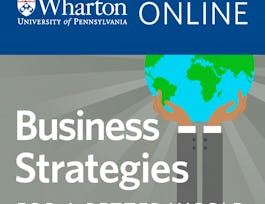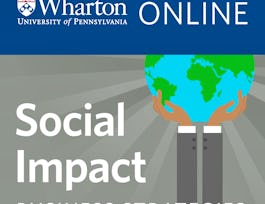In this course, you’ll learn to analyze rapidly changing global trends, their effects on consumer and labor markets, financial systems, and geopolitical relationships among countries all over the world. Professor Mauro Guillen of the Wharton School has designed this course to help you understand the magnitude of influence these trends have on the business world and society. Through real-world case studies, both historical and contemporary, you’ll examine how changes within one society affect others. By the end of this course, you’ll have gained the tools to be able to identify, analyze, and adapt to global changes as they affect your business and society.


Global Trends for Business and Society
This course is part of Business Strategies for A Better World Specialization
Taught in English
Some content may not be translated

Instructor: Mauro Guillen
17,176 already enrolled
Included with 
Course
(898 reviews)
98%
Skills you'll gain
Details to know

Add to your LinkedIn profile
4 quizzes
Course
(898 reviews)
98%
See how employees at top companies are mastering in-demand skills

Build your subject-matter expertise
- Learn new concepts from industry experts
- Gain a foundational understanding of a subject or tool
- Develop job-relevant skills with hands-on projects
- Earn a shareable career certificate


Earn a career certificate
Add this credential to your LinkedIn profile, resume, or CV
Share it on social media and in your performance review

There are 4 modules in this course
In this module, we’ll begin by examining the relationship between population size and density to the geopolitical balance of power in the world. You’ll learn key aspects of demographics (such as total fertility and life expectancy at birth) and how rapid demographic growth or decline affects global economic and geopolitical dynamics. Then, you’ll evaluate the economic and political impact of urbanization and migration within societies, and the consequences of these changes in population dynamics, both within a society and between countries. By the end of this module, you’ll have a richer understanding of the impact of demographic trends on financial markets, political systems, culture, and society.
What's included
9 videos3 readings1 quiz
This module was designed to give you a deeper understanding of how monetary trends and the distribution of monetary wealth affect the globe. Through close examination of global poverty and income inequality, you’ll learn critical concepts such as the Gini Coefficient and the Kuznets Curve, and how to use them as tools in analyzing the global distribution of wealth. You’ll also explore the rise of the global middle class, and how businesses are responding to the growth of middle class consumption. Finally, you’ll investigate the relationship between changing gender dynamics and wealth in the world. By the end of this module, you’ll be able to use effective analytical tools to form a clearer understanding of the effect of wealth within society and how it affects your organization.
What's included
6 videos2 readings1 quiz
In this module, you’ll examine the growing issue of global economic and financial imbalances. Through relevant examples such as the European Zone crisis, you’ll gain a deeper understanding of the effects of global economic dynamics on both individual countries and their relationships with one another. You’ll explore trade bloc controversies, different types of monetary unions (such as the European Union), and how financial imbalances affect the geopolitical balance and global economy. By the end of this module, you’ll be able to better assess the consequences of economic and financial imbalances on nations, markets, and societies, and be prepared to respond to these phenomena while making decisions for your organization and society.
What's included
8 videos2 readings1 quiz
In this module, you’ll explore global geopolitical landscapes and the global powers of the 21st century. Through examination of different political regimes—from autocracies to democracies—you’ll discover effective roles for states to play in society and its economy. You’ll also learn about failed states and anocracies, two importance sources of instability in the world, and how such instabilities manifest frictions and conflicts in the form of war and terrorism. Through analyzing the evolution of political regimes and failed states, you’ll learn the definition of global powers, the difference between and hard and soft power resources, and whether emerging global powers will cause dramatic changes in the existing geopolitical power structure. By the end of this module, you’ll have a deeper understanding of the trajectories of global powers, and be able to assess how the changes in geopolitical power structure will affect your business and society.
What's included
11 videos4 readings1 quiz
Instructor

Offered by
Recommended if you're interested in Governance and Society

University of Pennsylvania

University of Pennsylvania

University of Pennsylvania

University of Pennsylvania
Why people choose Coursera for their career




Learner reviews
Showing 3 of 898
898 reviews
- 5 stars
82.18%
- 4 stars
14.69%
- 3 stars
2.44%
- 2 stars
0.22%
- 1 star
0.44%

Open new doors with Coursera Plus
Unlimited access to 7,000+ world-class courses, hands-on projects, and job-ready certificate programs - all included in your subscription
Advance your career with an online degree
Earn a degree from world-class universities - 100% online
Join over 3,400 global companies that choose Coursera for Business
Upskill your employees to excel in the digital economy
Frequently asked questions
Access to lectures and assignments depends on your type of enrollment. If you take a course in audit mode, you will be able to see most course materials for free. To access graded assignments and to earn a Certificate, you will need to purchase the Certificate experience, during or after your audit. If you don't see the audit option:
The course may not offer an audit option. You can try a Free Trial instead, or apply for Financial Aid.
The course may offer 'Full Course, No Certificate' instead. This option lets you see all course materials, submit required assessments, and get a final grade. This also means that you will not be able to purchase a Certificate experience.
When you enroll in the course, you get access to all of the courses in the Specialization, and you earn a certificate when you complete the work. Your electronic Certificate will be added to your Accomplishments page - from there, you can print your Certificate or add it to your LinkedIn profile. If you only want to read and view the course content, you can audit the course for free.
If you subscribed, you get a 7-day free trial during which you can cancel at no penalty. After that, we don’t give refunds, but you can cancel your subscription at any time. See our full refund policy.

